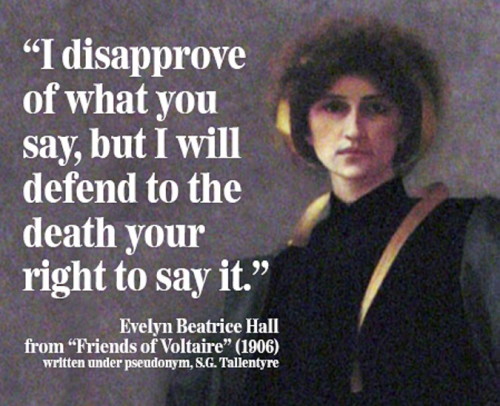Freedom of speech is under threat in America. Just last week, Sony Pictures Entertainment decided to cancel its planned release of the Seth Rogan comedy, “The Interview,” after the offended North Korean government hacked into its computer systems and threatened 9/11-style violence against moviegoers.
Expressing his disagreement with Sony’s decision, President Obama said, “We cannot have a society in which some dictator someplace can start imposing censorship here in the United States.”
The president is right, but the issue is not with any foreign dictator may think or do, but with us.
We have to be the ones who stand up for freedom of speech. We have to be the ones who fight censorship. We have to be the ones who welcome the controversial and even offensive.
For a long time now, though, we’ve been moving in the opposite direction. When it was asserted that the 2012 attack on the American consulate in Benghazi was provoked by an offensive video, our government did not stand up for the filmmaker’s rights to mock Islam. Instead, it responded by condemning the video and by jailing the filmmaker.
Likewise, when an incendiary southern preacher wanted to stage a protest by burning copies of the Quran, several leading figures of our government spoke out, not to vindicate his right to protest, but to prevent his action, in fear of what those taking offense might do in retaliation.
Our college campuses have become increasingly hostile to speech anyone might find offensive. Hence the proliferation of speech codes and the calls for “trigger warnings” in classes where emotionally frought topics might be discussed. Hence also the recent and depressing wave of dis-invitations of commencement speakers.
In our political life, too, we hear that there are too many negative political ads and that too many people are spending too much money trying to get their messages out.
What’s more astonishing and depressing about these developments is that they are taking place at a time when our Supreme Court has been vigorously defending the First Amendment.
As a matter of American law, one has every right to make a film depicting the assassination of a foreign dictator, or that mocks Islam, or Christianity, or Buddhism, or atheists, or anybody else.
As a matter of American law, one has every right to burn the Quran, just as one has every right to burn the American flag, or the Bible, or copies of the Communist Manifesto, or whatever else one pleases.
As a matter of American law, any individual, labor union, for-profit company or not-for-profit organization has the right to express its opinions on controversial matters of public policy.
Nevertheless, despite the libertarianism of our law, our culture is becoming increasingly censorious.
The problem is that, in these disputes, most of us naturally want to side against offensive speakers. We’ve never made a movie about assassinating any foreign leader. We’ve never wanted to make a video or burn a holy book just to express hostility to someone else’s religion. We’ve never scripted or directed an outrageously mean-spirited and unfair attack ad.
Such ugly forms of speech tend to make us uncomfortable. And so we tend to think there’s no loss to us, but only benefit for everyone, if the rude and offensive speakers are silenced, whether by law or by the power of public shaming.
But it is a mistake to think that freedom of speech is only a good thing for the relatively few people who wish to film, or say, or publish outrageous and offensive things.
It may be that speakers we now think of as outrageous in fact will turn out to have important things to teach us. But even when offensive speech is just offensive, we should protect it in order to preserve an open and free public culture.
We all benefit generally from the scientific and cultural advances that can only arise in a free society, but there is another and more direct benefit to preserving the culture of freedom: personal dignity.
When some people get to silence others, those doing the silencing are established as the superior, and their ideas given privileged treatment, while those being silenced are compelled to admit their inferiority.
To live in freedom and equal dignity is not easy. The price of never having to submit to being silenced by someone else is having to listen to what people we don’t like have to say — and then defending them when the thin-skinned and easily offended try to silence them.
Joseph R. Reisert is associate professor of American constitutional law and chairman of the department of government at Colby College in Waterville.

Send questions/comments to the editors.



Success. Please wait for the page to reload. If the page does not reload within 5 seconds, please refresh the page.
Enter your email and password to access comments.
Hi, to comment on stories you must . This profile is in addition to your subscription and website login.
Already have a commenting profile? .
Invalid username/password.
Please check your email to confirm and complete your registration.
Only subscribers are eligible to post comments. Please subscribe or login first for digital access. Here’s why.
Use the form below to reset your password. When you've submitted your account email, we will send an email with a reset code.